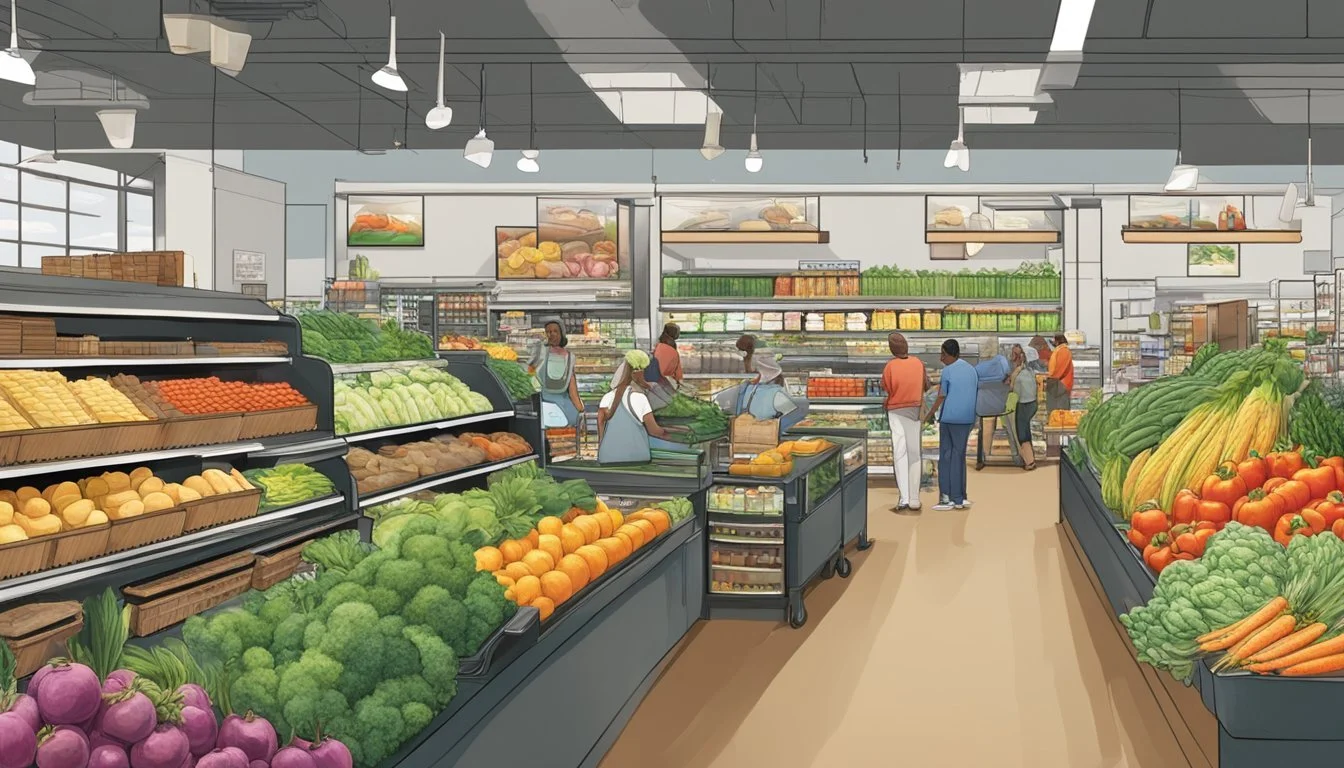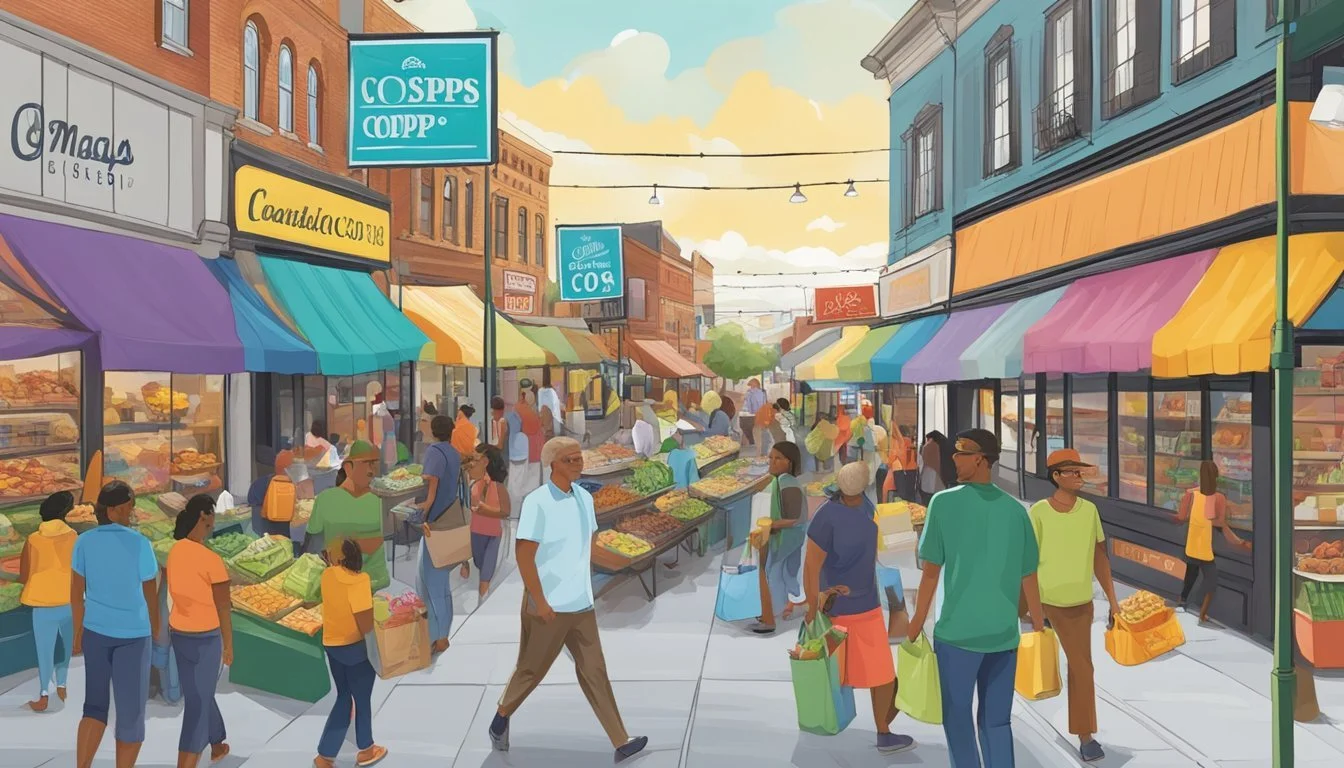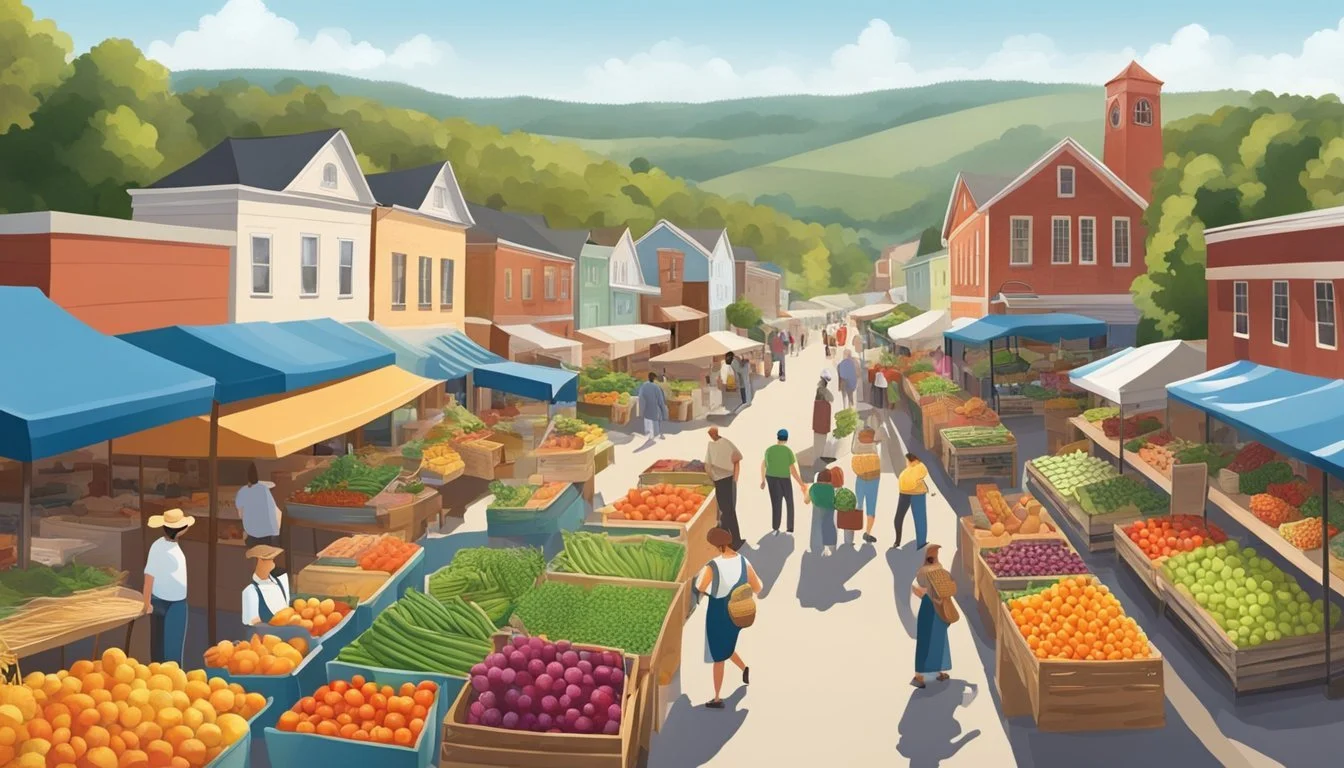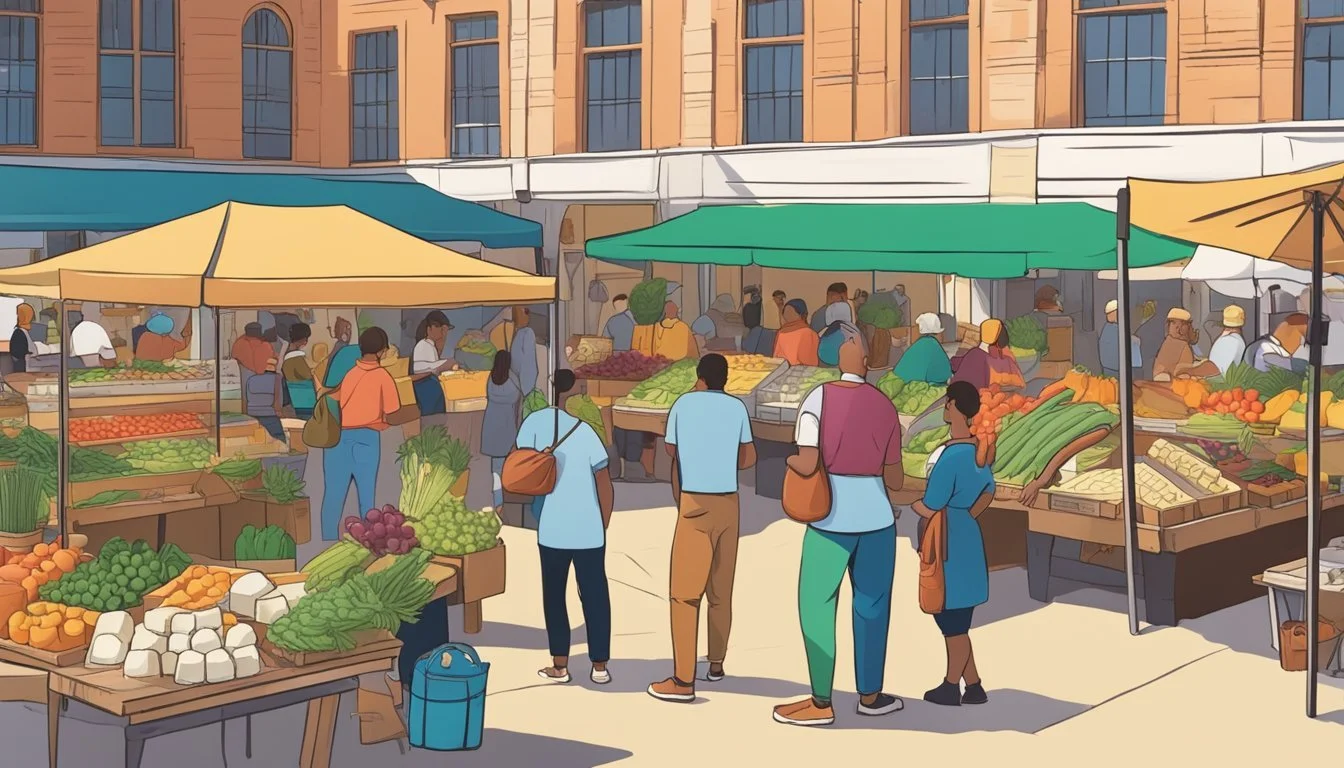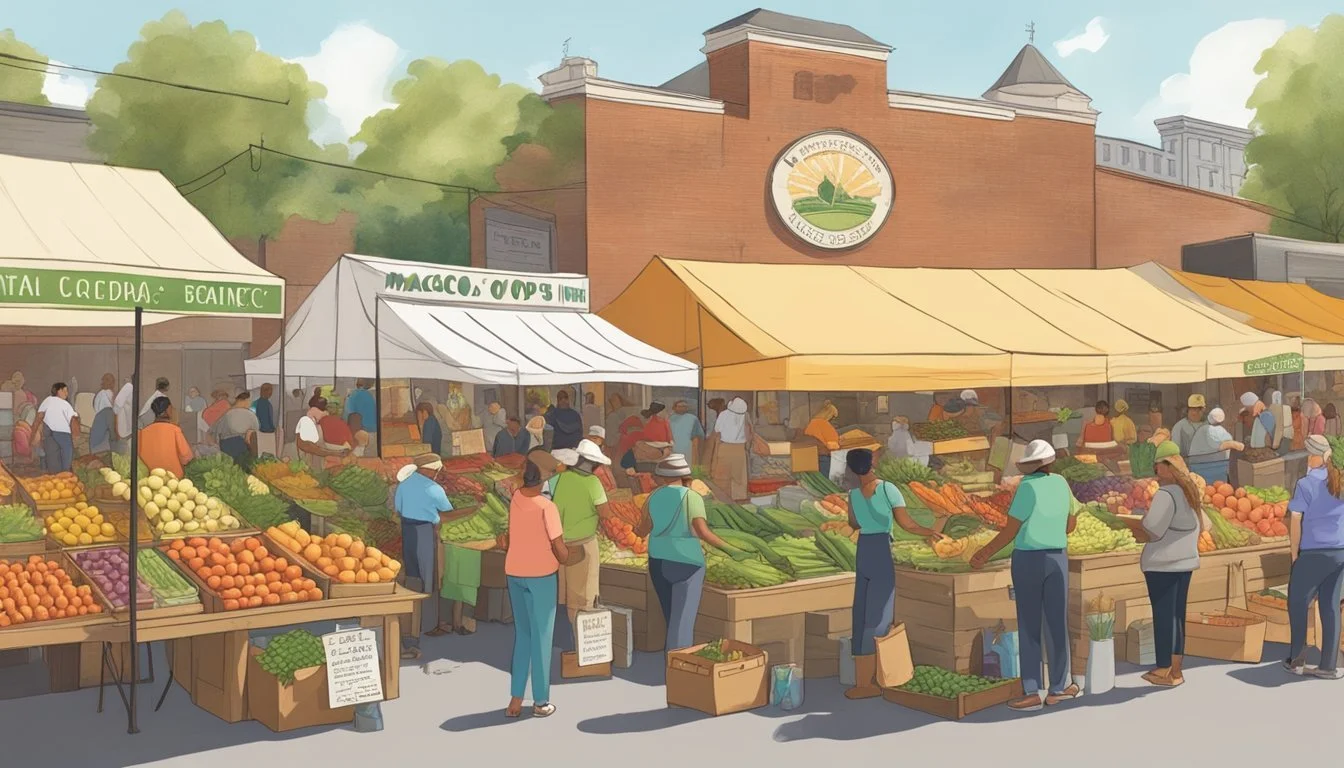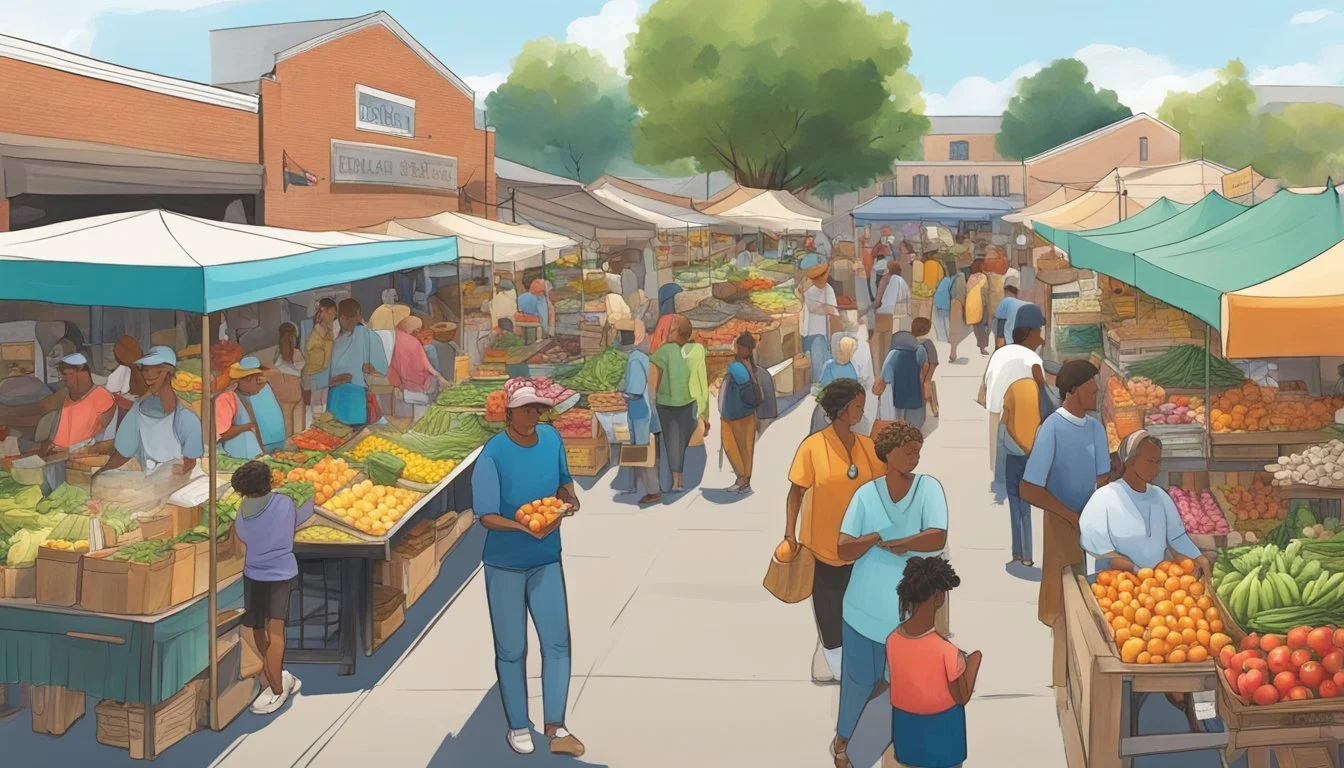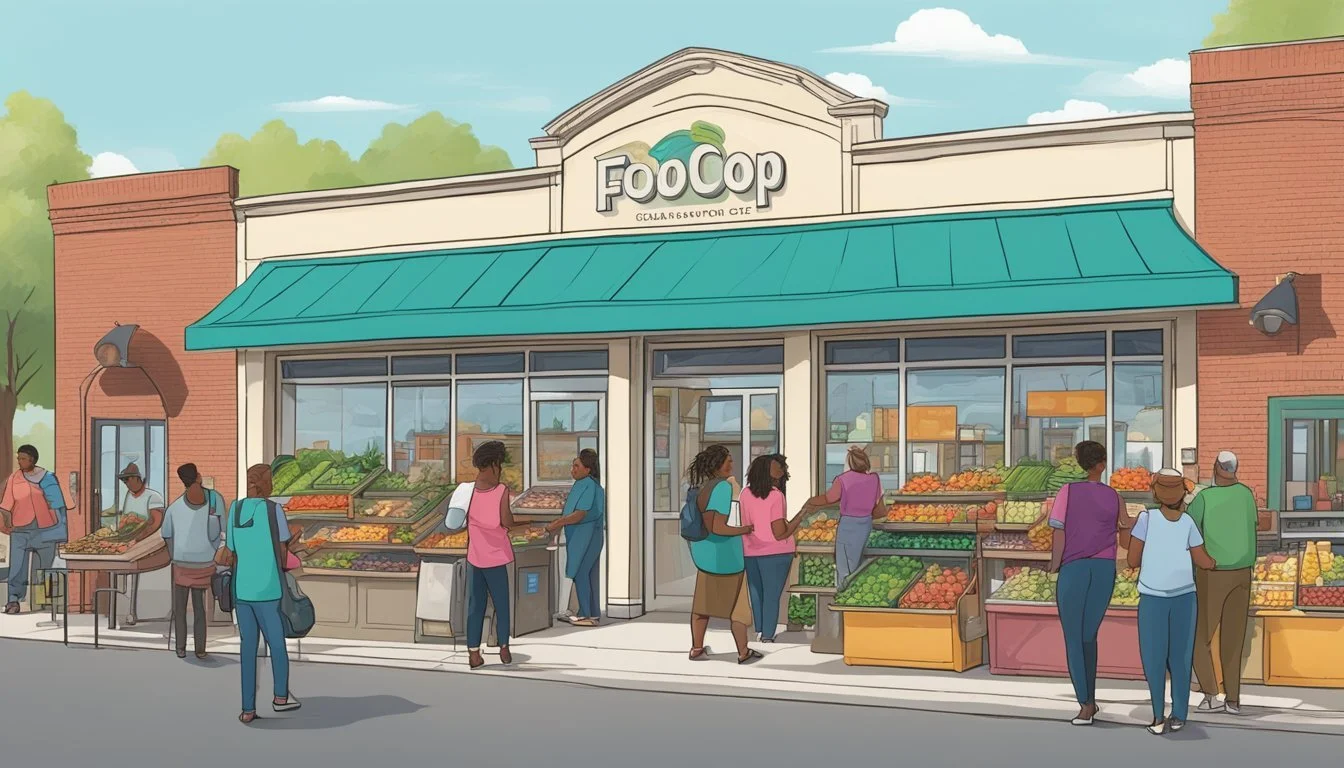Guide to Food Co-Ops in Macon, GA
Your Essential Resource for Local, Community-Owned Groceries
Macon, Georgia, offers a vibrant array of food co-ops that are rooted in the community's commitment to sustainable and locally sourced produce. These cooperative food entities provide residents with an alternative to traditional grocery shopping, focusing on fresh, organic options that support local farmers and artisans. Food co-ops in Macon are not only a source of nourishment but also serve as social and economic cornerstones that reinforce the fabric of the community.
Food co-ops in Macon address various needs, including the challenge of food deserts, areas with limited access to affordable and nutritious food. The Napier Heights Food Co-op, for instance, emerged as a community response to such a need. By fostering a model of collective ownership and decision-making, these co-ops empower members and encourage engagement in local food systems.
The city's commitment to food sustainability is further evident in the regular gatherings such as the Cherry Blossom Farmers Market & Essentials, providing a year-round platform for residents to access locally grown produce. These co-ops and markets not only offer fresh food options but also contribute to the local economy while enhancing Macon's sense of community and shared well-being.
What is a Food Co-Op?
A food co-operative, typically known as a food co-op, is a grocery store format that operates on a membership model. Food co-ops are distinguished from conventional supermarkets by their ownership structure: they are owned and democratically controlled by their members—the customers who shop there. These members invest in the co-op to obtain voting rights and a share in any profits.
Here are key characteristics of a food co-op:
Local: They emphasize local produce and goods, which bolsters the local economy and reduces the environmental impact of transportation.
Organic: Many food co-ops focus on offering organic options, catering to consumers who prioritize food that is free from synthetic pesticides and fertilizers.
Fresh: With an emphasis on fresh produce, co-ops often source directly from local farmers, ensuring that the fruits and vegetables are as fresh as possible.
Food co-ops typically operate under a commitment to provide:
A range of healthful food choices
Fairly priced items
Support for local producers
In a food co-op, members influence product selection, pricing, and the overall strategic direction of the store, aligning it with community needs and values. By purchasing a membership, individuals have the ability to both financially support and guide the store. This unique ownership model makes a food co-op a community-centric alternative to traditional grocery stores, which prioritize investor interests.
Benefits of Joining a Food Co-Op
Joining a food co-op in Macon, GA, brings both personal and community advantages. One significant benefit is the access to fresh, local produce. Co-ops often establish strong relationships with nearby farmers, meaning members can enjoy fruits and vegetables at their peak freshness. This not only supports the local economy but also reduces the carbon footprint associated with long-distance transportation, championing sustainability.
Moreover, many co-ops prioritize organic options. For those invested in consuming foods free from synthetic pesticides and fertilizers, co-ops can be a trusted source of organic groceries. By choosing to stock such items, these organizations reflect a commitment to the health of their members and the planet.
The very nature of a co-op promotes a strong community bond. Members benefit from a shared sense of ownership and decision-making power. Each member has a voice in the operations, from selecting products to governance, fostering a democratic approach to shopping and community building.
Economic benefits also exist. While the primary goal isn’t profit, any earnings are often reinvested into the co-op or shared among members. Additionally, bulk buying and member discounts can lead to cost savings, making high-quality food more accessible.
Benefits Description Local Produce Access to products from nearby sources. Organic Options Availability of food grown without synthetic chemicals. Community Support Engagement with like-minded individuals and collective decision-making. Sustainability Promotion of environment-friendly practices. Economic Advantages Potential for member savings and profit sharing.
A food co-op in Macon isn't just a grocery store; it's a pivotal institution within the community that prioritizes health, sustainability, and local prosperity.
Finding Food Co-Ops in Macon
Macon, GA, a city where tradition meets contemporary needs, offers residents and visitors the opportunity to participate in a health-conscious and community-centric shopping experience through food co-operatives (co-ops). These co-ops are not only places to eat and shop but are also a collective movement towards localized and sustainable food systems.
Farm To Fork and Cherry Blossom Farmers Market & Essentials are two notable listings where individuals in Macon can find fresh, organic produce alongside other grocery staples. They serve as cornerstones to the community, not just providing food but also fostering local agriculture.
Farm To Fork
Location: Macon, GACherry Blossom Farmers Market & Essentials
Location: DPI Macon, GA
Another prominent feature for those interested in sustainable and organic shopping is the Bluebird CSA. Located in nearby Thomaston, GA, it is a short drive from Macon and offers a wide selection of the best local, organic food items.
Furthermore, initiatives are underway to improve access to affordable groceries in the historic Napier Heights area, indicating a growing network of food co-ops within the city of Macon, which reflects a trend towards greater food accessibility and community engagement.
By supporting these food co-ops, individuals contribute to the local economy and gain access to healthier, locally-sourced food. They become part of a movement that values transparency, sustainability, and community well-being.
For those who are eager to explore these offerings, a visit to any of the mentioned co-ops will reveal the true spirit of Macon's commitment to community-supported agriculture and healthy living.
The Role of Local Farms and Producers
Local farms and producers form the backbone of food co-ops in Macon, GA, ensuring a steady supply of fresh, locally-sourced, and often organic produce that caters to the community's needs and preferences.
Agriculture and Food Co-Ops
In Macon, GA, agriculture serves as a vital link between food co-ops and the community. Local farms contribute to co-ops by providing a diverse selection of fresh produce, which is integral to the co-ops’ commitment to sustainability and local economy. These partnerships are essential for food co-ops to offer items that are not only fresh but also support local agricultural efforts. Local food co-ops often prioritize organic and sustainably-grown foods from these producers, reflecting a shared commitment to environmental stewardship.
Local Products and Specialties
The shelves of Macon's food co-ops highlight an array of local products, showcasing the region's specialties and the talents of its producers. These might include:
Seasonal fruits and vegetables: A selection of the freshest picks from nearby farms.
Handcrafted cheeses: Examples of local artisan skills, often made with organic milk from regional dairies.
Homemade preserves: Capturing the essence of local harvests in every jar.
By emphasizing local products, food co-ops in Macon not only bolster the regional food economy but also cater to consumers' desire for local and organic options that support their health and the environment.
Community Engagement and Events
Engagement in Macon’s food co-ops goes beyond providing fresh produce; they also serve as hubs for educational workshops and are fostering local arts and culture, contributing significantly to the community's dynamics.
Workshops and Education
Food co-ops in Macon, GA prioritize the community’s growth by offering a variety of workshops that aim to educate individuals about sustainable farming techniques and nutritional information. These workshops are designed to empower residents with the knowledge to start their own urban farms or make healthier food choices. Events may cover topics such as organic farming practices, food preservation, and cooking classes that focus on using local, seasonal ingredients.
Local Arts and Culture
The food co-ops in Macon also act as a platform for local artists and cultural events, providing space where the community can explore and celebrate the rich tapestry of the region's arts scene. From live performances to art exhibits, the food co-ops integrate cultural activities in their regular markets, turning everyday shopping into a vibrant community experience. They support local artisans by featuring their crafts and works, preserving and uplifting the culture of Macon.
Membership Information
Food co-ops in Macon, GA offer community members an opportunity to benefit from collectively purchasing food and sometimes even participating in the governance of the cooperative. Membership details can vary from one co-op to another, but typically involve some common elements.
Eligibility and Registration:
Persons of any age are eligible for membership, though most cooperatives require individuals to be at least 18 years old to hold a share or to serve on the cooperative's board. Interested individuals can usually sign up for membership by completing an application and purchasing a membership share. The application process may require presenting valid identification and paying a fee.
Membership Benefits:
Members can expect a variety of benefits such as:
Discounts on food and other items
The opportunity to participate in special members-only events
Voting rights in the cooperative's decision-making processes (for those of eligible age)
Membership Tiers and Costs:
Basic Membership often includes a one-time fee or annual dues; the specific amount can be obtained directly from the co-op.
Enhanced Membership may offer additional benefits and could require further investment or volunteer commitments.
Volunteering and Involvement:
Many co-ops encourage or require members to contribute volunteer hours. In return, members might receive additional discounts or other incentives.
Prizes and Rewards Programs: Some co-ops may run periodic rewards programs or raffles for their members, providing chances to win prizes ranging from food baskets to vouchers.
The exact features of a membership may differ, and potential members are encouraged to contact the individual food co-ops in Macon, GA for the most accurate and current information.
Exploring Macon's Culinary Scene
Macon, Georgia boasts a vibrant food scene, known for its distinctive blend of traditional flavors and innovative dining concepts. Visitors and locals alike can indulge in a diverse range of eateries that embody the spirit of Southern hospitality and culinary creativity.
Macon's Iconic Restaurants
Macon's dining landscape is dotted with iconic restaurants that offer an authentic taste of Southern cuisine. The Rookery, a local landmark, stands out with its classic American fare and legendary burgers. Here, guests can savor dishes that have satisfied the community for decades.
The Rookery: Known for its juicy burgers and rich milkshakes.
Another local favorite is the soul food dining spot, where comfort food is served with a side of history. These establishments are not just places to eat; they are part of Macon's cultural fabric.
Soul Food Eateries: Featuring traditional dishes like fried chicken and collard greens.
Diverse Dining Options
The city's food scene extends beyond Southern staples to global fare, offering an eclectic mix of dining options.
International Flavors: From Italian pizza to Thai cuisine, there's a variety of international tastes.
Local Breweries: For those interested in craft beers, local breweries provide a pairing for every palate.
In Macon, whether one craves smoky barbecue, gourmet delights, or international dishes, there is a corner to cater to that desire.
Barbecue and Pizza: Smoky flavors and Italian classics share the culinary stage.
Vegetarian and Special Diets
Macon understands the growing demand for vegetarian and special diet options and meets this need gracefully.
Vegetarian Delights: A selection of local restaurants now offer creative vegetarian dishes (What wine goes well with vegetarian dishes?) that even meat-lovers admire.
Health-Conscious Choice: For those following strict dietary regimens, several eateries emphasize fresh, locally-sourced ingredients.
Patrons seeking vegetarian options can relish in a variety of dishes that are both nutritious and flavorful.
Vegetarian Options:
The Rookery: Provides vegetarian burger variations.
Local Restaurants: Serve salads and vegetable-centric dishes.
Macon's culinary scene celebrates the coalescence of diverse cuisines and dietary preferences, ensuring everyone finds something to their liking.
Local Recommendations and Reviews
Food co-ops in Macon, GA offer residents access to fresh, locally-sourced groceries and create a space for community connection. Patrons value these spots for their quality products and support of the local economy. This section spotlights top-rated food spots and uncovers hidden gems in Macon that are recommended by locals.
Top-rated Food Spots
Dovetail consistently receives rave reviews for its farm-to-table approach and exceptional Southern cuisine. Diners highly recommend the restaurant for both its atmosphere and its inventive dishes. It stands out as a fine dining option worth visiting in the heart of Macon.
Ingle Side Village Pizza offers a more casual dining experience, popular for their specialty pizzas and friendly service. Both establishments have made a mark on Macon's food scene with patrons often highlighting the quality and taste of the meals served.
Hidden Gems in Macon
Tucked away in Macon are lesser-known venues that surprise diners with their offerings. These hidden gems receive high praise from local patrons and can be just as satisfying as bigger, more well-known establishments:
Farm To Fork provides a refreshing take on the local farmers' market experience. It empowers local growers and provides a variety of fresh, organic options for those who treasure healthier food choices with direct community impact.
The Cherry Blossom Farmers Market & Essentials in Macon has been highlighted for bringing a selection of specialty foods that might not be found in typical grocery settings. Enthusiasts of organic and artisanal products frequent this market for their unique finds.
Historical Ties to Macon's Food Culture
Macon, Georgia, boasts a vibrant food culture with deep historical roots, from iconic eateries to the evolution of Southern flavors that tell the city's story.
Historical Landmarks and Eateries
Macon's historical ties to food are closely interwoven with its heritage landmarks and long-established eateries. Nu-Way Weiners, opened in 1916, is renowned for its signature red hot dogs and chili sauce, making it a Macon staple for over a century. This longstanding establishment is more than a restaurant; it's a cultural icon that reflects Macon's culinary history.
Another significant name in Macon's food scene is H&H Restaurant, an eatery with a profound connection to the city's music history. H&H gained legendary status in the 1970s due to its link with Capricorn Records and nurturing Southern rock bands like the Allman Brothers with soul food, thereby fusing Macon's musical and culinary legacies.
The Evolution of Macon's Cuisine
The culinary landscape in Macon embodies a blend of traditions and modern tastes, reflecting an evolution that has embraced innovation while honoring its roots. Macon's cuisine has been shaped by its Southern flair, a term that encompasses the region's affinity for comfort food with a generous touch of soul.
Regional agricultural products and practices have also influenced the local food scene, with an emphasis on community through food co-ops and farmers' markets. These food collectives not only provide access to fresh, local produce but also act as conduits for preserving and passing down the culinary traditions that contribute to Macon's distinct Southern identity.
A Guide to Dining Out in Macon
Macon offers an array of dining options to suit any meal of the day. Patrons can enjoy Southern comfort foods, local delicacies, and multicultural cuisine across an eclectic mix of establishments.
Breakfast and Brunch Options
For a delightful start to the day, Macon presents several breakfast and brunch (What wine goes well with brunch?) spots that provide hearty meals and lighter fare. The Rookery is a long-standing favorite for its ambiance and a well-rounded menu that includes breakfast and brunch classics. Diners seeking an Asian-inspired breakfast can visit Kinjo Kitchen for a fusion of traditional and contemporary dishes.
Lunch Favorites
When lunchtime arrives, the choices in Macon are plentiful. Among them, Loom offers a fresh farm-to-table experience, showcasing seasonal produce in their lunch offerings. Sandwiches, salads, and a variety of mains compose the bulk of the midday menu, catering to an array of palates.
Dinner and Late Night Eats
As the day winds down, the culinary scene in Macon lights up with dinner and late-night options. From upscale dining experiences to casual, hearty pub fare, establishments cater to all kinds of evening diners. Southern and international flavors combine to create memorable meal choices for anyone exploring Macon's nighttime food offerings.
Food Co-Ops and Health
Food co-ops in Macon, GA, offer a unique opportunity for the community to invest in their health through improved nutrition and access to organic foods. These co-operative models prioritize organic produce, emphasizing the value of healthy eating.
They often stock a diverse range of whole foods that are minimally processed, providing essential nutrients without the added artificial ingredients found in some conventional grocery items. Regularly including organic foods in one's diet can contribute to better health by reducing the intake of synthetic pesticides and fertilizers.
The communal aspect of food co-ops fosters a space where individuals can learn about nutrition and make informed choices. Many co-ops host educational programs, offering valuable insights into the benefits of consuming organic and wholesome foods. These co-ops are known to support:
Local Farmers: By sourcing from local growers, they guarantee fresher, nutrient-rich produce.
Seasonal Selections: Emphasizing seasonal produce, which is often at its peak in both flavor and nutritional value.
Environmental Health: Organic farming methods used by co-op suppliers typically have a lower environmental impact.
The table below highlights the nutritional advantages of choosing organic produce found at food co-ops:
Nutrient Benefit of Organic Produce Vitamins Higher levels in some organic fruits and vegetables Antioxidants Potential for greater concentration in organic plant-based foods Omega-3 Fatty Acids Higher amounts found in organic dairy and meat
In Macon, GA, embracing food co-ops is a significant step towards nurturing one's health and supporting sustainable practices. The emphasis on organic and healthy food choices reflects a commitment to the well-being of the community and the environment.
Economic Impact of Food Co-Ops
Food co-operatives, or food co-ops, contribute significantly to local economies. In Macon, GA, the presence of these co-ops supports economic growth by creating jobs and bolstering local businesses. Food co-ops typically operate with an ethos of community support, meaning they often procure goods from local farms and producers. This practice sustains and promotes the vitality of the local agricultural community.
An example of the economic contributions can be exemplified by the National Co+op Grocers (NCG) members' average performance, which shows that a single member food co-op can purchase from as many as 281 local farms and producers. This direct purchasing relationship injects capital into local businesses, enabling them to thrive amidst competition from larger grocery retailers.
Economic Factor Impact of Food Co-Ops Jobs Create employment opportunities Local Economy Increase spending with local vendors Revenue Member co-ops generate sales locally
Food co-ops also contribute by creating jobs, both indirectly through the demand for local products and directly through employment within the co-op. These jobs range from retail positions to roles in management and operations.
It's crucial to note that these contributions are achieved without reliance on large, corporate structures. Instead, the revenues generated and jobs created by food co-ops cycle back into the local economy, fostering resilience and stability. Despite challenges such as food deserts and competition from big-box retailers, food co-ops in Macon, GA, demonstrate a sustainable model of economic impact rooted in community and collaboration. The collective economy model encourages inclusive growth and shows how shared ownership in the food sector can have a lasting local benefit.
Future of Food Co-Ops in Macon
The landscape of food cooperatives in Macon, GA, is one that aligns with growth and sustainability, focusing on meeting community goals. In Macon-Bibb County, where the prevalence of food deserts is high, the development of food co-ops is a promising solution to improve access to affordable and nutritious food.
Sustainable Practices: The rise of regenerative agriculture practices among farming communities supplying these co-ops is a testament to their commitment to sustainability. These practices, going beyond organic farming, aim to improve soil health, biodiversity, and carbon sequestration, ultimately contributing to climate change mitigation.
Community Engagement: Food co-ops in Macon are increasingly becoming community-centric, with plans in neighbourhoods like Napier Heights to introduce new, walkable grocery outlets. By fostering closer connections with local producers and focusing on local needs, these co-ops work towards creating resilient and self-sustaining food networks.
Growth Trajectory: The cooperative model has shown potential for growth, with local food co-ops like the Detroit People’s Food Co-op planning expansions aimed at addressing food insecurity. Macon's food co-ops may follow a similar growth pattern, providing not just food but also a platform for social and economic development.
Member Benefits: While membership in many co-ops is not necessary for shopping, member-owners often enjoy added advantages. These may include patronage dividends in profitable years, reinforcing the mutually beneficial relationship between co-ops and their members.
Food co-ops in Macon thus stand at a promising intersection of community revitalization, sustainable agriculture, and economic growth. Through collaborative efforts, they are set to play a pivotal role in transforming Macon’s food systems for the better.

